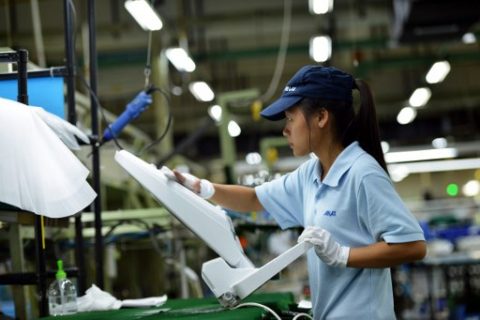
China’s growth slipped to a new seven-year low of 6.6 percent in the second quarter, according to an AFP survey, despite government efforts to spur activity in the world’s second-largest economy. / AFP PHOTO /
by Allison JACKSON
Agence France Presse
BEIJING, China (AFP) — China’s economy lost momentum in the second quarter, a survey shows, as Beijing’s efforts to curb risky lending and investment took a toll on the Asian powerhouse.
The world’s second-largest economy expanded by 6.8 percent in the April-June period, compared with a year ago, according to the median forecast of 12 analysts polled by AFP.
That follows a better-than-expected increase of 6.9 percent in the first three months of the year.
The estimate comes ahead of the official release on Monday of China’s closely-watched GDP growth data for the second quarter.
Debt-fueled investment in infrastructure and real estate has underpinned China’s growth for years but warnings of a potential financial crisis have spurred Beijing to clamp down.
In the latest alert, Fitch Ratings on Friday said China’s growing debt could trigger “economic and financial shocks” even as it maintained its A-plus rating on the country.
That follows Moody’s decision in May to downgrade China for the first time in almost three decades on concerns over its ballooning credit and slowing growth.
Tighter restrictions on property purchases and bank lending will continue to weigh on the economy in the months ahead, said Larry Hu, head of China economics at Macquarie Group.
“We expect GDP growth to trend down in the second half of 2017 on slowing property sales and tight liquidity,” he said.
The economy is likely to face further headwinds as consumption also comes under pressure from slowing income growth, said Fan Zhang, senior China economist at RHB Bank.
UBS chief China economist Tao Wang said “higher funding costs due to supervisory tightening” will impact fixed-asset investment — which measures spending on real estate, roads and bridges.
But a sharp slowdown in the second half is unlikely as policymakers prepare for an important Communist Party congress later this year that will likely make President Xi Jinping the most powerful leader in a generation.
“It is therefore highly probable that authorities will use the resources and policy tools at their disposal to ensure a positive economic outcome,” Citibank said.
The government has trimmed its 2017 GDP growth target to around 6.5 percent, after it expanded by 6.7 percent in 2016 — its slowest rate in more than a quarter of a century.
Despite growing concerns about China’s financial risks, Premier Li Keqiang said last month that the country could reach this year’s economic growth targets.
Last quarter’s growth momentum had continued into the current one, he said, noting that traditional economic indicators such as power generation and consumption, and new business orders had increased “significantly”.
© Agence France-Presse







